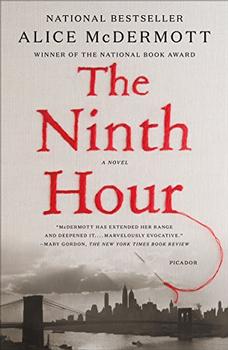Book Club Discussion Questions
In a book club? Subscribe to our Book Club Newsletter and get our best book club books of 2025!
For supplemental discussion material see our Beyond the Book article, The Little Sisters of the Poor and Sister St. Jeanne Jugan and our BookBrowse Review of The Ninth Hour.
Please be aware that this discussion guide will contain spoilers!
- How does Annie choose to remember her husband, Jim? How is his daughter, Sally, like him? Do you relate to the grandchildren's response when they finally learn the truth about his death?
- How does the work that Sisters Lucy, Jeanne and Illuminata choose suit their individual talents and personalities? How do they differ in their beliefs about God and faith, sin and human weakness? Which of the three perspectives do you feel most drawn to?
- What did you think about McDermott's theme relating to the wisdom imparted by the older characters to the young? For example, Sister St. Savior becomes an invaluable mentor to Annie when she is newly widowed, and all of the Sisters jointly help raise Sally. How did the disconnect between Patrick Tierney's father and grandfather demonstrate the drawbacks of not having these types of relationships?
- The Ninth Hour is as much a series of linked stories as it is one story told chronologically. What did you think of the format?
- How did you feel reading about Sally's experience on the train ride to Chicago? How was she changed by the events that occurred there? Could you relate to her revulsion or did you find her response dramatic?
- How did the Sisters' religious faith help them when serving the community? What does sister Lucy mean when she tells Sally that "If we could live without suffering...we'd find no peace in heaven"? Why do you suppose Sally has trouble incorporating this level of faith into her own life?
- The full name of the order to which the sisters belong is "the Little Nursing Sisters of the Sick Poor, Congregation of Mary Before the Cross, Stabat Mater." To Sister Jeanne, Stabat Mater symbolizes the triumph of love over brutality. To Sister Illuminata, it means that love applied to suffering is "like a clean cloth to a seeping wound." Why do you suppose McDermott chose "Stabat Mater" for the title of the chapter about Sally coming home from Chicago and discovering the truth about Annie and Mr. Costello?
- What do we know about Sally and Patrick's married life? What strengths and faults have each of them brought to the marriage?
- In contrast to Sister Jeanne, Sister Lucy seems skeptical, pragmatic, and often disgruntled. "All joy was thin ice to Sister Lucy," McDermott writes. But Sister Lucy is also a skilled nurse and a fierce advocate for people who are poor, sick, or mistreated. What does Sally learn from Sister Lucy, not only about nursing, but also about the human capacity for cruelty and kindness? How do you think Sister Lucy's prickly personality makes her a better caretaker?
- What is "the ninth hour" and how is it observed in the convent? What is its biblical meaning? Why might Alice McDermott have chosen it as her title?
- How does Red Whelan's fate reverberate down through the generations of the Tierney family? What did you think the author was trying to say about sacrifice through this character?
- Liz and Annie become close friends when their children are small, yet their lives are very different. How are Liz's beliefs and the practice of her faith different from Annie's, and how do they make this friendship work? Do you have friendships like this in your life?
- Sister Jeanne teaches the Tierney children that "God wants us to know the truth in all things," yet there are many parts of their family story they do not know the truth about. Who are the truth tellers in the book? Who lies, embellishes, or withholds the truth, and what do you think about their reasons for doing so? How does the family's story change as it is told and retold? How might Patrick and Sally each tell the story of the day they fell in love?
- Why do you suppose Annie is not dismissed from the convent laundry when the nuns learn of what they call her "indiscretion" with Mr. Costello? Did you relate to McDermott's discussion of the different types of "hunger" in the chapter titled "A Tonic"? What is the "tonic" being referenced here?
- Did you find Mrs. Costello to be a sympathetic character or did you merely pity her? How was Sally changed by her death?
- How did you feel about the sequence of events leading up to Mrs. Costello's death? How soon did you realize what Sally was planning? What does Sister Jeanne mean when she tells Sally, "God is fair. He knows the truth"?
- Why did Sister Jeanne tell Sally's children that she has "lost heaven"? Do you think she was being too hard on herself?
- Were you taught by nuns at any point in your schooling? If so, what are your most lasting memories?
Unless otherwise stated, this discussion guide is reprinted with the permission of Picador.
Any page references refer to a USA edition of the book, usually the trade paperback version, and may vary in other editions.
